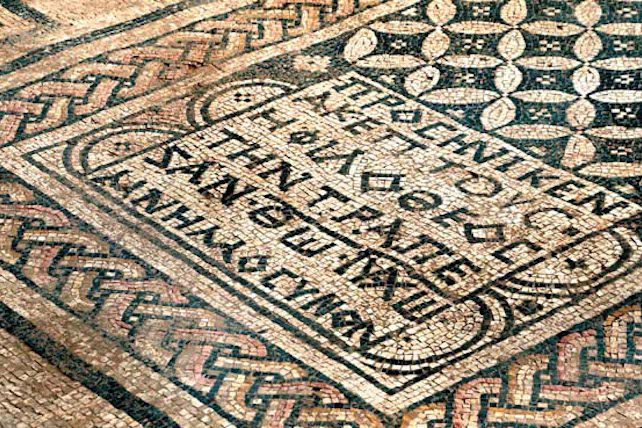An ancient Christian mosaic discovered in Tel Megiddo, Israel, in 2005 has become the subject of controversy, in part because authorities are considering uprooting the mosaic from its location. Another reason is that Israeli officials are considering loaning the mosaic to the Museum of the Bible (MOTB) in Washington, D.C.
Museum of the Bible “of course would welcome the opportunity to educate our thousands of visitors on important pieces of history such as this mosaic,” Jeffrey Kloha, Museum of the Bible’s chief curatorial officer, told the Associated Press (AP). But the decision regarding whether the loan will occur is entirely in the hands of the Israel Antiquities Authority (IAA), which has yet to make a decision on the matter.
Museum of the Bible Might Receive Megiddo Mosaic
The Megiddo Mosaic was discovered on the grounds of Megiddo Prison. Authorities planned to expand the facility, which houses detained Palestinian security inmates, and were concerned that the additions would harm any artifacts in the area. During rescue excavations, IAA discovered the mosaic. The artifact refers to Jesus as God and is located in what is believed to be the earliest Christian prayer hall in the world.
It is thought that Tel Megiddo is the source of the word “Armageddon,” a term that appears in Revelation 16 as the site of a battle between God and the kings of the earth.
The IAA is considering moving the mosaic in order to protect it from construction at Megiddo Prison. In 2022, The Times of Israel reported that authorities were actually considering moving the prison.
Some scholars are inherently opposed to moving the mosaic at all. “Once you take any artifact outside of its archaeological context,” said Candida Moss, a theology professor at University of Birmingham, “it loses something, it loses a sense of the space and the environment in which it was first excavated.”
Others oppose the artifact going to Museum of the Bible. Cavan Concannon, a religion professor at the University of Southern California, told AP that the institution promotes Christian nationalism.
The museum’s founders are Steve and Jackie Green. Steve Green is chairman of the board of the museum and the president of Hobby Lobby.
Since opening in 2017, MOTB has been at the center of several controversies because of artifacts it possessed that were found to be stolen or forgeries. In 2017, Hobby Lobby was fined $3 million for purchasing artifacts stolen from Iran. In 2018, it came to light that MOTB was in possession of a stolen medieval New Testament manuscript, which the museum thereupon returned to the University of Athens.

